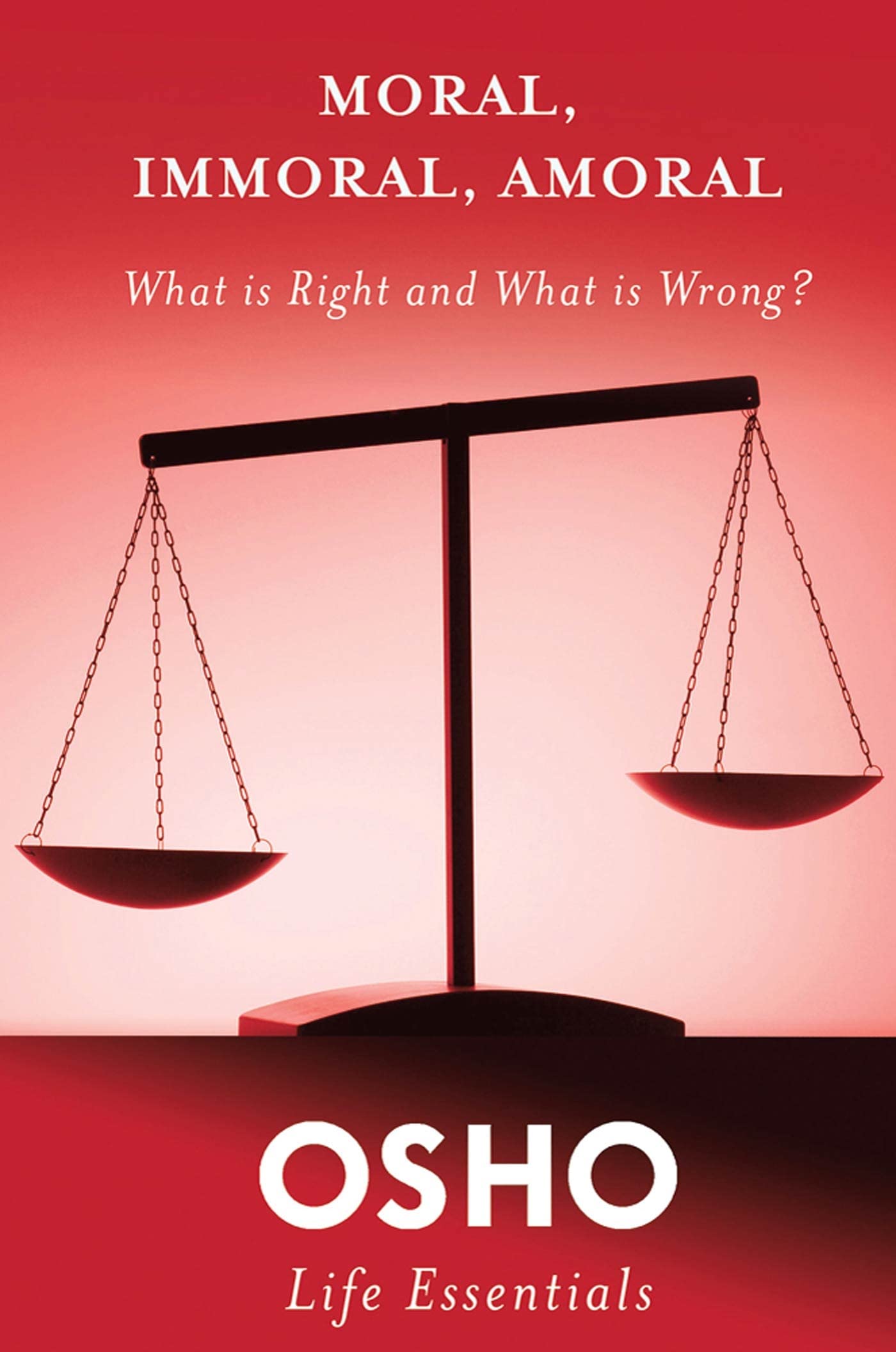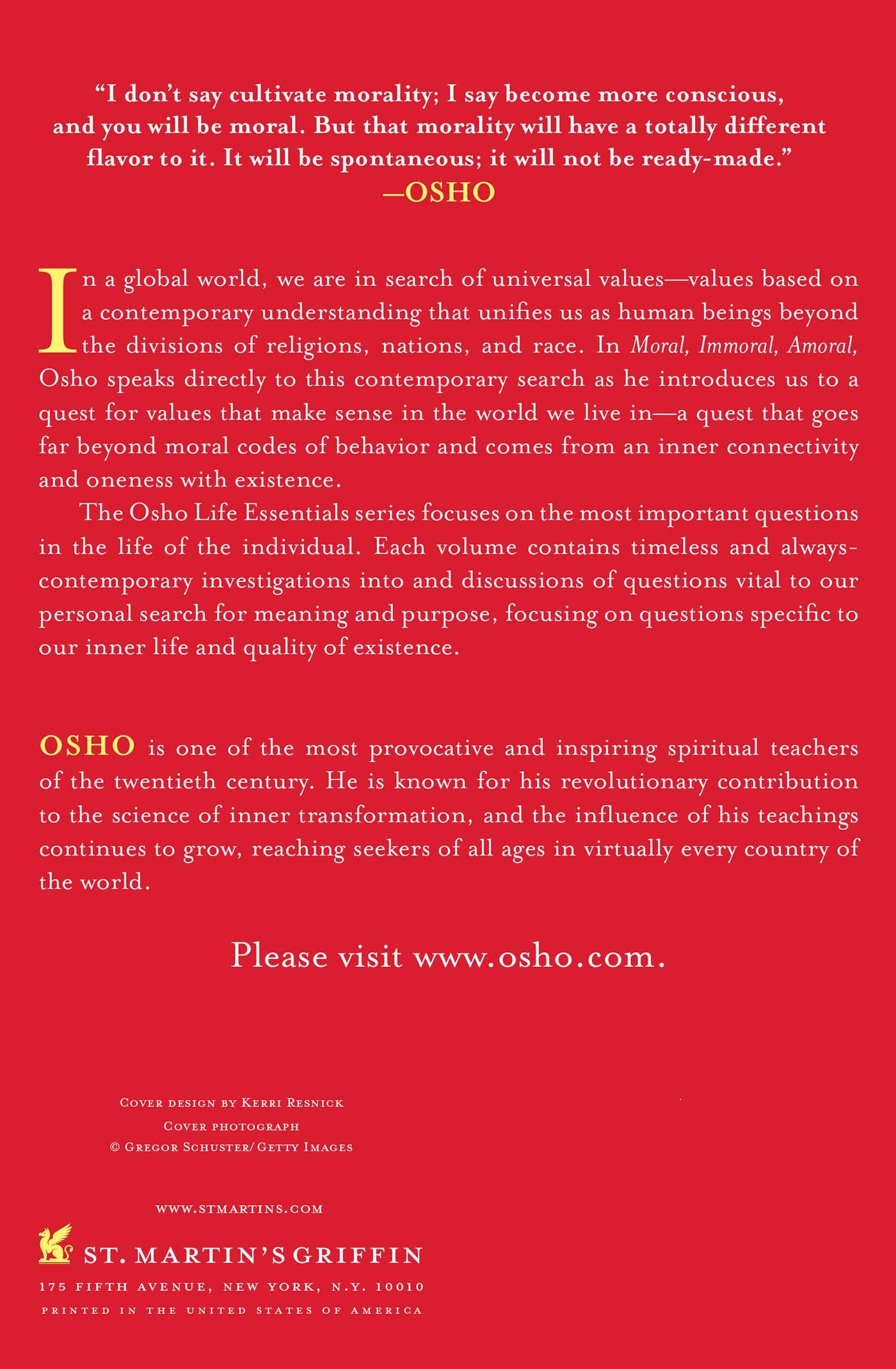Customer Services
Copyright © 2025 Desertcart Holdings Limited



Full description not available
P**M
Osho never disappoints.
Osho is someone you will really enjoy and resonate with or you will be totally out of sync with.I own many of his books (actually books written from his talks) and thoroughly enjoy his very unique and nonjudgmental approach to life.
Z**S
OSHO...THERE IS HOPE AHEAD FOR THE NEW HUMAN
OSHO..a man for the ages. His message should be read by everybody. He makes one rediscover the authentic self that was forgotten under the darkness of ignorance, and false information about life..belief systems..and fear..
M**S
Five Stars
Excellent Book !
M**T
Osho's my guru
My collection of Osho wisdom books has become my New Bible (in fact, I have tossed my Old and New Testaments in the ash bin being so much outdated moral gibberish to carry with me into the 21st century). This new title by Osho, actually transcribed talks by the Indian zen master, dating back to the 1970s, has been professionally and seamlessly edited to read like a book. While I don't always agree with Osho, he does passionately describe what is needed for the New Man ("Homo novas" or as Osho says, "Zorba the Buddha") to emerge on Earth. This title is a guide to a new morality that throws out all religious tripe which often denies our humanity with all its warts. Also, I love how Osho redefines the concept of God. "He's" not a person or a noun but instead is a verb. God, as Osho explores in part of this book, doesn't exist as a Judeo-Christian personal god (it never has); instead, "God" really is Nature itself... the ceaseless process of creation and destruction, much as quantum physics describes the Cosmos today: yes, it' a creatorless universe which emerged from the 'nothing' of quantum foam. So, it is we who are ultimately free of God and now responsible for how we live and die. The most amazing revelation (to me) of Osho's wisdom is that there never was a divine parent for us to run to like little children. If you give Osho words time to penetrate, he may just turn your head around. He may be able to help you kick start a new way of living (as he kick started mine a few years ago). So, thank you, St. Martin's Press, for continuing to publish new Osho works. It is deeply appreciated by Osho neo-sannyasins such as myself. (Swm. L. Anando)
A**R
Five Stars
Thank you!
J**N
Was Osho a psycopath?
Was Osho a psychopath? If so, it would seem quite bizarre he would indulge in 'moralizing about moralizing' like a second rate student of Nietzsche who never read a book of Kant on ethics. First, this series of books are from the Osho disciple sausage machine of homogenized 'osho-ism' so we aren't quite sure who is speaking (there is no such book in the original Rajneesh/Poona hardback series, but there are core quotations that make discussion reasonably on track).Was Osho a psycopath? There term is psychiatric but it seems psychiatry would not correctly assess a figure like Osho. Was Gurdjieff Beelzebub? In the latter case he admitted to being a demon. In many ways his imitator Osho appears demonic but he only confessed to being a 'buddha', not a demon. (Many hindus thought Buddha Gautama a demon and his path a journey into hell, and Osho charged some faction of late 'esoteric' buddhists with creating nazism with a drone Hitler). .But Osho's claim to be 'enlightened' is subject to severe doubt such is the sheer chaos of his movement with its drug money, prostitution, and criminality, to say nothing of Osho's drug habit and shenanigans .with his dentist. It seems Osho was apparently brazen enough to fake enlightenment (with a brief higher state of consciousness soon waning, hence the convenient talk of being 'beyond enlightenment') and create a neo-buddhist religion without a buddha.If the book gets two stars instead of one it is because it is a challenge to even worse religious morality, witness the truly dreadful shambles of the Mosaic myth and its canon of commandments. Yet the latter had at least the primitive almost charming archaism of a primitive Canaanite world making a first attempt at a monotheistic moral law. in the context of the barbarism of child sacrifice (whose dilemmas (?) persist into the Old Testament. The christians quickly sensed a problem and attempted one of the first universal principle corrections with the theme of love.The Osho answer is another stab at a universal one-liner in a brand of 'new agey' jargon: consider the blurb on the back cover: 'I don't say cultivate morality, I say become more conscious and you will be moral...' We should note there is a further contribution here by another Osho must have imitated, Crowley, with his 'do what thou will ...' (with a love lemma thrown in). The apotheosis here must be Crowley's sacrifice of a frog, hey, do not what thou wilt...please...The world has mored into a reformation beyond 'buddhas' perhaps, if Osho is no buddha and cannot think through the issues of morality. Let us note the large moral baggage of buddhism, and the indic/yogic priniciple of karma. The doctrines of Karma are inchoate yet have suffered a strong rebuttal from a number of new age 'gurus' who have declared there is no such thing as 'karma'. But the realm of advaita perhaps rightly points to the possibility of some kind of 'imprint' of action in one life passing into the next at the level of some deeper aspect of self (in the usual muddle of concepts here): but then what is the canon of karmic judgment (our version can avoid this). This complicates the question with kantian unknowables as metaphysics, which doesn't mean they are wrong, But the issues are now too complex for resolution: we must resolve the issue of soul, reincarnation, and the nature of the 'between lives' bardo and its relation to questions of physics. Small wonder we seek refuge, in vain, in one liners from the 'Prophet'. Osho's one liner is clearly another muddle: we can't define what we mean by 'conscious', And we can't therefore resolve the question of who is a buddha. And we are stuck finally with the ambiguity of who is a buddha, and further the ambiguity of what happens to buddhas after they die, and what relation religious movements, with their ersatz moralities, have to dead 'founders' (who may or may not be buddhas). It is said that 'buddhas' pass beyond the realm of existence and rebirth but we can't be sure of this and we can't assess whether these 'entities' don't still interact with worldly beings: if they do they can't have surpassed existence,We confront the buddhas equivalent of covert agent psycopaths with a license to kill.Osho in chapter 3 actually comes out and states that murder and rape are only wrong if they are done without awareness, and that's new age nonsense from a horse's ass claiming to be a buddha.Imagine civil society on such a principle: these yogis have spent too much time renouncing the world and living in a forest. Civil society does not compute. But Osho is the worse for not renouncing anything and grafting a spurious buddhist canon onto capitalist free for all.It is ironic that a rascal like Nietzsche sensed the problem but then got it wrong because he was stuck in scientism: why would these would be buddhas trust his judgment in a spurious modernism grafted on to ancient legacies, this without reading what Nietzsche is referring to: Kant, how in one way was the first man in history to see an answer: the categorical imperative, a logical act of mind deliberating acts of will. No doubt Nietzsche though he saw beyond Kant, but this seems doubtful. We should be wary even of kantian one liners, but surely Kant got one part of the issue right, a true historical first. Kant was no saint, nor a prophet, but a philosopher (perhaps that's a relief, but he may have violated his own imperative). Unfortunately his work is not really a canon of ethics in practice and is still somehow primitive or incomplete (note the confusion over lying in a classic critique of Kant) but it is perhaps the first partially successful approach to the incoherence of religious morality, to which we should add the new age Osho style canon. Again, the problem is the ambiguity of the term conscious, and fallacy that some kind of mindfulness exercise makes anything you do 'OK'.Crowley (and better Gurfjieff, or else his student Bennett) at least got one thing right: the issue is not consciousness, but 'will'. Which is what?The universal muddle of ethics is not surprising: we have no real understanding of the 'will'. Science can't find it, can't discuss 'free will', but neither can the 'buddhas' who are stuck on consciousness and negate or deny the will. But Crowley's 'will' is based on a suspicious practice resembling the path to enlightenment. And this climatically results by report in some explosion as the Will. But the spurious texts such as the canon of Abramelin the Mage, a scrofulous text that Crowley himself admits attracts the entrance of 'demons'. The path to the will can also be warned of as leading to the mass production of demons.Perhaps Crowley's naivete can be corrected by the view of Bennett (The Dramatic Universe) in his systematic study of the 'will' on all scales with its careful distinction of the mechanical self, the conscious/pseudo True Self (ambiguously doubloon), the True Self, the Individuality, and more beyond that. The consciousness of the pseudo self, the true self, and the individuality potentially resolve the confusions but still don't solve the issue of ethics. Some future science, neuroscience, some kantian revision, more intelligent of that rascal huck finn Nietzsche, and a post-buddhist practive without caudillo buddhist gangsters, and we can see a new man emerge for the first time with a real consciousness and morality...
S**A
Just read Osho's words - is enough
I need not say much about Osho.Those who like him will keep loving him and vice-versa equally true.While I don't know what the haters have the rationality for their feelings - for me Loving him is because I get absolutely clear in terms of my thought process when I read him.The words just keep flowing while I am reading the book
A**E
Good
I like it
A**R
It will gives you Clarity and ends to delimma
If you are absorbed in thinking about right and wrongs or you have been moral or Supported Wrongs then u must read it.
A**R
Excellent insight
A must read for everyone. Insightful, thoughtful and path guiding book of this era. Everyone must go through it once
A**R
A candid commentary!
I have never come across a man as candid and as frank as Osho. His words aren't suppressed by any theology or scripture. Whatever he says comes out of his being. His words appear like a flowing river. One can see how profound his philosophy is. He writes through his experiences and deep insights rather than letting holy books dictate morality. Osho understands the complexity of human psyche and howsoever blunt he may be, he wants man to follow religion out of freedom of choice. Moreover, he wants man to be religious through meditation. His observations regarding human beings are so accurate. His scientific temperament is clearly reflected in his words. This man was a true genius. We need his words because his words reflect the spirit of renaissance. I am grateful to have read such a brilliant and refreshing commentary on the ostensibly most talked about topic in the world i.e. morality.
Trustpilot
2 days ago
3 weeks ago
2 months ago
2 months ago